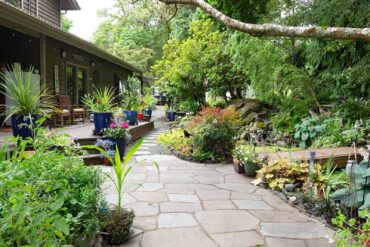 Candy Gratton began gardening at the tender age of 5 when she and her parents lived with her grandparents for a time in California. Her grandfather’s garden had been featured in Sunset magazine. Wanting to instill a love of gardening in her too, he allocated a spot to her.
Candy Gratton began gardening at the tender age of 5 when she and her parents lived with her grandparents for a time in California. Her grandfather’s garden had been featured in Sunset magazine. Wanting to instill a love of gardening in her too, he allocated a spot to her.
“I’ve been gardening and growing my own produce ever since,” she says.
Gratton — an only child — and her parents spent part of each year with her father’s work assignment in California and part time here in Keyport. Her grandmother was a Watland, one of 12 family members who came to this area directly from Norway to homestead.
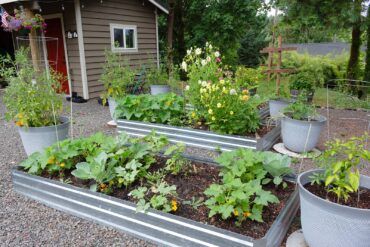 Gratton has lived most of her life on her family’s nearly 7-acre section of the original homestead land. Her son, Butch O’Donnell, and his wife live on an adjoining piece of land. She is very happy to have him nearby because, she says, “he does lots of the maintenance and heavy workload of keeping up all this land.”
Gratton has lived most of her life on her family’s nearly 7-acre section of the original homestead land. Her son, Butch O’Donnell, and his wife live on an adjoining piece of land. She is very happy to have him nearby because, she says, “he does lots of the maintenance and heavy workload of keeping up all this land.”
This beautiful and pastoral property slopes down to the shores of Liberty Bay. Many trees, possibly over 100 years old, can be found while strolling the grounds.
Gratton points out cork trees and a cabin on the property. Loggers originally lived in the cabin and her father harvested bark from the cork trees. The bark was used to insulate the inside of ships.
Nearby is a 100-year-old walnut tree. A beautiful, old, gnarled apple tree is resplendent with blooms in the spring, and apples are harvested in fall, but also shared with local deer. Marauding troops of raccoons also hang out in the apple tree. Gratton is OK with that, but she really doesn’t appreciate the raccoons, who like to climb up the rhododendrons right outside her dining room window.
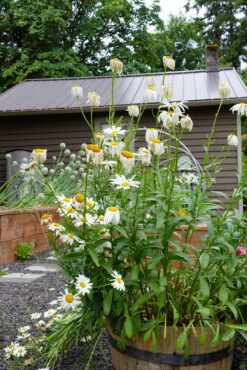 This magical space, shown and visited on the 2023 Keyport Garden Tour, features a lovely pond built by Gratton and her friend, whom Gratton described as an amazing woman artist. Visitors will also find a greenhouse, hoophouse, workshop and several areas of raised beds with year-round edibles.
This magical space, shown and visited on the 2023 Keyport Garden Tour, features a lovely pond built by Gratton and her friend, whom Gratton described as an amazing woman artist. Visitors will also find a greenhouse, hoophouse, workshop and several areas of raised beds with year-round edibles.
Blackberries have been removed, most of the time, but some are left to flower and produce berries to make jam each fall. Several acres of lawn are mown by Gratton’s son. These areas were once horse pastures, but are now several spaces for bow-and-arrow target practice and field exercises. A huge garage houses the equipment and another large toolshed houses all the tools needed to maintain the property.
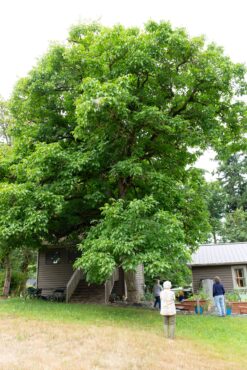 Gratton has participated and competed in Senior Olympics for the past 10 years. In 2023, she won the Senior Olympics women’s high jump. She participates in javelin, discus, high jump, shotput, long jump, running and archery and loves watching online films of these events.
Gratton has participated and competed in Senior Olympics for the past 10 years. In 2023, she won the Senior Olympics women’s high jump. She participates in javelin, discus, high jump, shotput, long jump, running and archery and loves watching online films of these events.
“I won the high jump doing the ‘Fosbury Flop.’ Dick Fosbury won the 1968 Olympics in Mexico for his famous high jump,” Gratton says. “You throw yourself backwards over the high bars.” This is only one of Gratton’s many talents and interests.
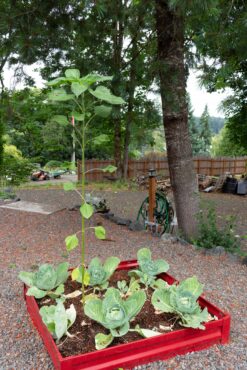 She won the Little Britches Kitsap Rodeo Princess when she was 6 years old. As an adult, she has served as national adviser for the Miss Rodeo America. Gratton’s daughter was Miss Rodeo Washington and now lives on ranch land in Eastern Washington.
She won the Little Britches Kitsap Rodeo Princess when she was 6 years old. As an adult, she has served as national adviser for the Miss Rodeo America. Gratton’s daughter was Miss Rodeo Washington and now lives on ranch land in Eastern Washington.
Gratton’s interests in archery came from when her two children were in Kitsap 4-H and started taking archery lessons and competing. Gratton, her son and her daughter-in-law still practice archery on the rolling lawns on the property. They practice javelin and shotput on a section of lawn that slopes uphill.
How does she manage to find time to grow such abundant crops of vegetables and fruits and still care for this 7-acre piece of heaven in Keyport? Gratton’s middle name is Star and she says that describes her life. She has had many careers in her seven decades of life, but the overriding theme is that she enjoys helping and teaching people.
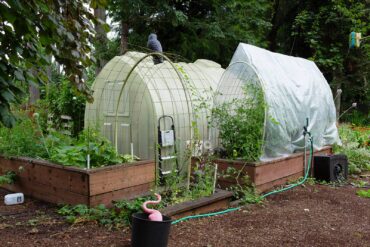 The third annual Keyport Garden Tour is in June. Living in Keyport, Gratton attended the first garden tour and soon contacted the garden tour committee to offer her property and gardens as part of the event in 2023.
The third annual Keyport Garden Tour is in June. Living in Keyport, Gratton attended the first garden tour and soon contacted the garden tour committee to offer her property and gardens as part of the event in 2023.
“It’s not a pride thing,” she says. “I love to show people how to grow things.”
She explains that she wanted to show others how to grow vegetables from seed sown directly outside or from seed in the greenhouse, in the hoop house, in raised beds and directly in the soil, and how to grow vegetables year-round.
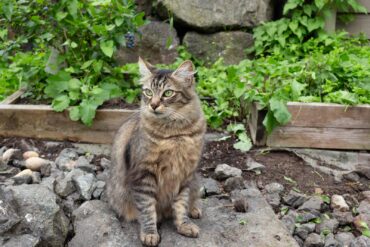 In addition to gardening on her own land, she volunteers from April through August at the Master Gardeners Heritage Garden at the Kitsap County Fairgrounds. The produce is donated to local food banks. The garden, located next to the heritage log cabin behind the back entrance of Presidents Hall, features edible plants including flowers. You can visit it on Tuesday mornings April through August and every day during the Kitsap County Fair.
In addition to gardening on her own land, she volunteers from April through August at the Master Gardeners Heritage Garden at the Kitsap County Fairgrounds. The produce is donated to local food banks. The garden, located next to the heritage log cabin behind the back entrance of Presidents Hall, features edible plants including flowers. You can visit it on Tuesday mornings April through August and every day during the Kitsap County Fair.
“We grow vegetables that can be grown beginning in April and harvested the end of August, when the fair is over,” she says.
Gratton became a WSU Kitsap Extension Master Gardener five years ago when she retired. She has been volunteering at the Heritage Garden with a team of Master Gardeners ever since.
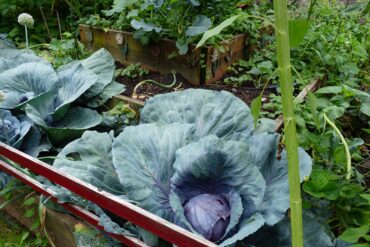 For some unknown reason, people seem to drop off cats in the Keyport area. Forest and shorelines seem to beckon to these cats. Visitors to Gratton’s bit of heaven are often greeted by furry felines of all shapes and sizes. Gratton was once married to a veterinarian, so she has a network of vets and their families who help her round up the cats and find homes for them. Several of those cats have become Gratton’s companions. Cats that have become too feral are captured and neutered and then released back onto her property.
For some unknown reason, people seem to drop off cats in the Keyport area. Forest and shorelines seem to beckon to these cats. Visitors to Gratton’s bit of heaven are often greeted by furry felines of all shapes and sizes. Gratton was once married to a veterinarian, so she has a network of vets and their families who help her round up the cats and find homes for them. Several of those cats have become Gratton’s companions. Cats that have become too feral are captured and neutered and then released back onto her property.
Washington State University fans will love the story Gratton tells: “Our son was born in Pullman when my husband was attending vet school at WSU. Butch was named after the cougar mascot.” Apologies to our Husky fans. Gratton also likes Husky dogs, too. She rescued a very small dog now named Jose Jimenez, who is one of her many furry companions. She has fostered dogs and cats, too.
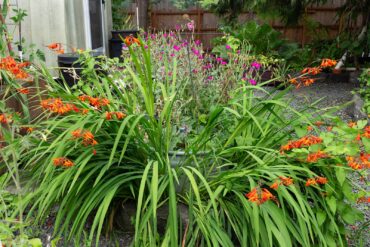 In January, when Gratton was interviewed, she had just harvested Brussels sprouts and broccoli from her garden. She was preparing to plant seeds to start in the greenhouse. These seedlings will be planted in March.
In January, when Gratton was interviewed, she had just harvested Brussels sprouts and broccoli from her garden. She was preparing to plant seeds to start in the greenhouse. These seedlings will be planted in March.
When asked what her favorite vegetable is, she replies, “Tomatoes. I love tomatoes!” That’s part of why she has two hoophouses. One is devoted to providing tomatoes, with the heat needed for maximum yields and to prevent tomato blight that certain tomato varieties get during some summers.
This time of the year, Gratton is likely happily out in her garden (or greenhouse) planting up lettuces, beets, peas, radishes, turnips, broccoli, cabbage, potatoes and onions. Outside in the ornamental gardens, rhododendrons are ready to flower, hostas are popping up, hydrangeas are beginning to leaf out, bulbs are everywhere and the fruit trees are beginning to be covered with buds that will flower in the months ahead. Mason bees will be pollinating the early flowers.
She and her son will also be cleaning up the garden from the winter, placing dead leaves, twigs and other dead vegetation into the compost piles, which will be turned frequently. Later, these nourishing, shallow layers of finished compost will help prepare the gardens for spring, summer and fall abundance.
Anyone looking for help and inspiration will find Master Gardeners at the local farmers markets. They’re great resources to answer questions about the things growing in the garden. You might even find Candy Gratton on duty the day you visit — make sure to stop by and say hello.




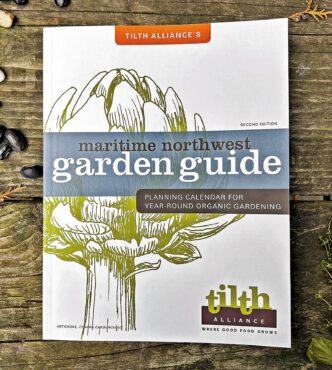
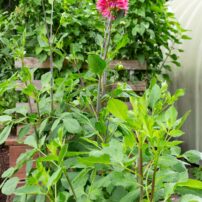
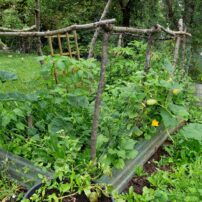
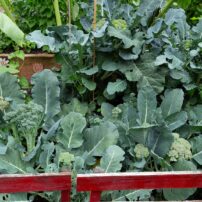
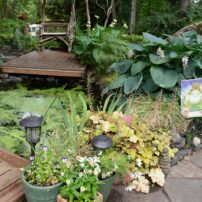
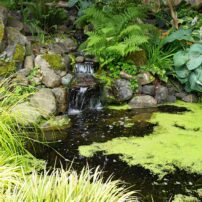
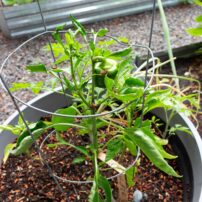
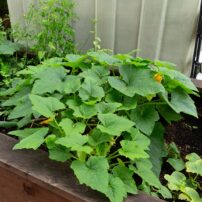
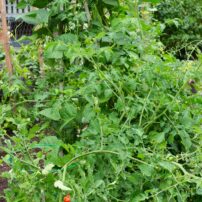
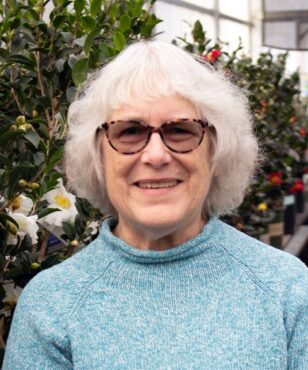
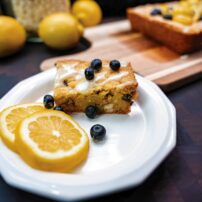
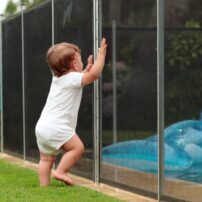


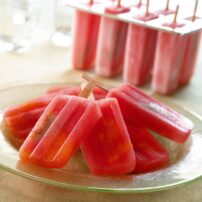

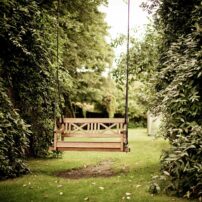




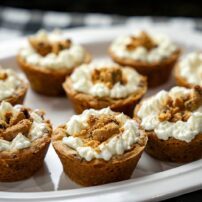
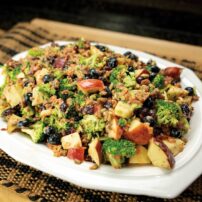
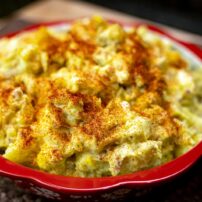
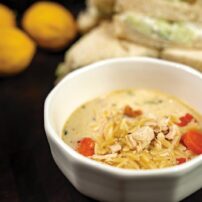








Comments